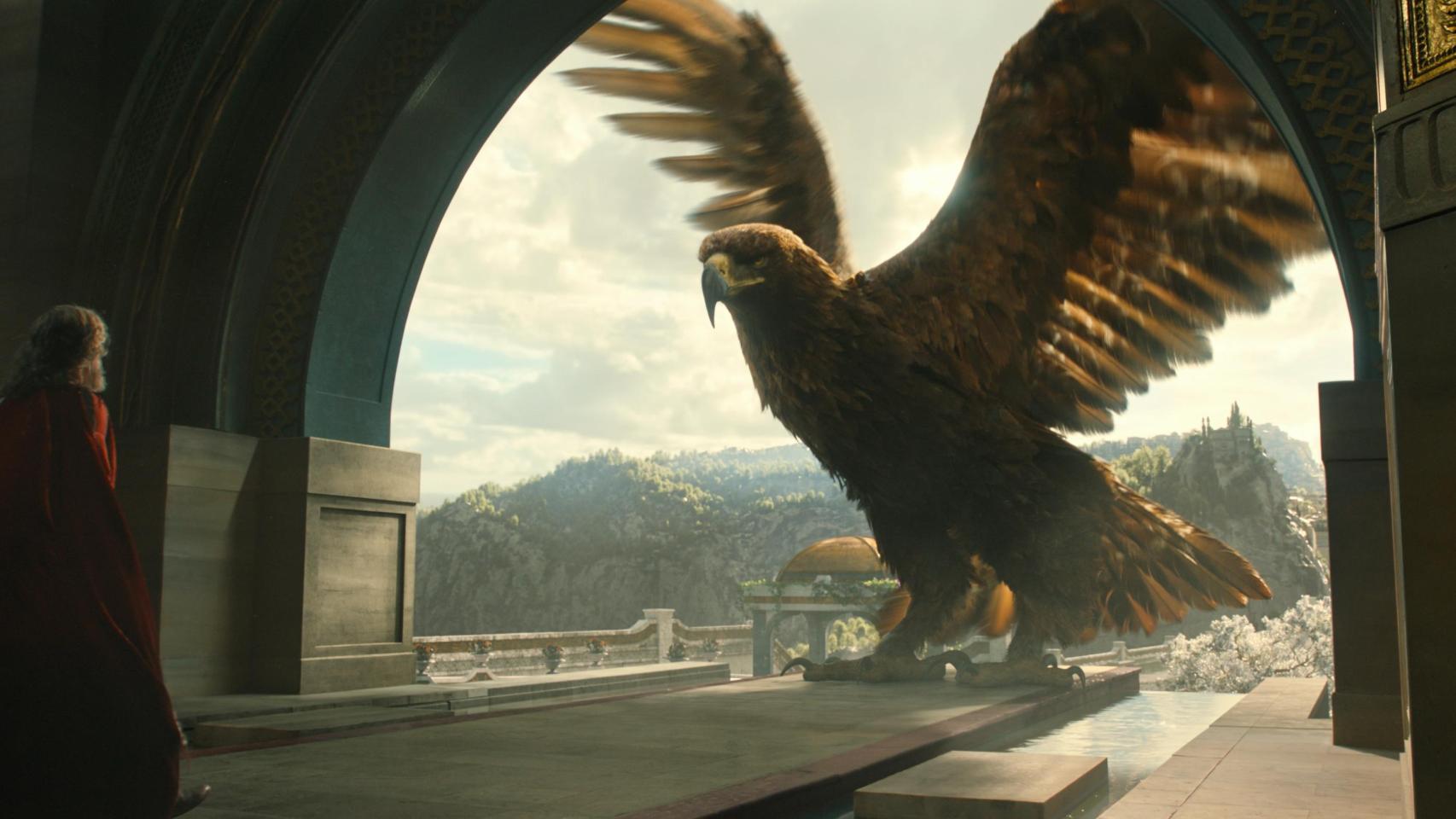After having seen the first three episodes of the second season of The Rings of Power, many viewers must have stopped to think about several specific scenes. One of them is the one that concludes the third episode, which in a visually spectacular way introduces us to a kind of giant eagle that bursts into the court of Númenor in an important scene.
While Regent Queen Míriel (Cynthia Addai-Robinson) is being crowned in front of a restless crowd, an eagle enters the scene, causing even more chaos than there already was. It is at this moment that her cousin and political rival Pharazon (Trystan Gravelle) decides to take advantage of the situation to proclaim himself as the new king of Númenor.
Sword in hand, Pharazon approaches the eagle in a somewhat confusing but pivotal sequence in the future of these characters and of Númenor in general. That's why we try to gather what the meaning of this scene is and where these winged beings come from.
The Eagles in Middle-earth
An Eagle attacks some orcs
In order to explain why an eagle appears in Númenor, we have to go back in time and see what its role is in J.R.R. Tolkien's universe. These winged beings appear both in the books and in the movies of The Hobbit and The Lord of the Rings and their job is to serve as spiritual guides when the protagonists are in trouble.
The power of these eagles is immense and not only are they majestic and gigantic beings, but they are also very sensitive, and enclose great nobility and wisdom. It is said that they were created by Manwë, the chief of the Valar -the angelic beings who shaped the world and care for it-, and that their function is to serve as messengers and observers in Middle-earth.
The fact that they appear or intervene rarely leads to the thought that they have a strong sense of justice, so it seems that their connection with Númenor is crucial, and that they are really there because the situation requires their wisdom.
The meaning of the scene
Throughout the First and Third Ages, the Great Eagles played an important role, and when they appear it is usually in the form of omens or warnings. After Morgoth's defeat at the end of the First Age, the men who fought against the Dark Lord alongside the Host of the Valar received Númenor as a token of gratitude, and the ties between them were strengthened. And it may be that they entered the scene because an injustice is about to be committed.
The Eagle scene in 'The Rings of Power'
Númenor only existed during the Second Age and, in this period, the Eagles were very present on the island. It is said that they lived in the northern area and are revered by the inhabitants of Númenor, but although they are seen frequently, they usually remain on the sidelines of what happens both in Númenor and in Middle-earth. However, as Númenor becomes more corrupt under the influence of some of its monarchs, like Ar-Pharazon -as he will be known in the future- the Eagles become a reminder that the country has fallen from grace.
Considering how Eagles are perceived in Middle-earth, it is easy to understand why Pharazon would want them on his side. In The Rings of Power we have already seen how he and Míriel talk about her father, Tar-Palantir (Ken Blackburn), remembering the moment he was crowned and how an eagle appeared.
We also heard Pharazon comment that, if an eagle also appeared at his coronation, it would be a good auspicious omen. However, even if this happens, it may not have the meaning he believes.
When the Eagle appears is during Míriel's coronation. Eärien (Ema Horvath), daughter of Elendil (Lloyd Owen) and sister of Isildur (Maxim Baldry), causes a commotion by showing Míriel's Palantir, and the Regent Queen confirms that it is indeed hers, creating the perfect uproar for Pharazon to take advantage of. It is in the midst of all the confusion that the Eagle makes its appearance, landing on the balcony of the royal palace.
In fact, when Pharazon decides to take advantage of the Eagle's appearance, the mythical creature spreads its wings and begins to screech in a way that seems more hostile than friendly. And that's why we might think that the Eagle is supporting Míriel during her coronation, in addition to the fact that, when Pharazon draws his sword, the bird flies away.
*This article has been translated automatically using artificial intelligence
